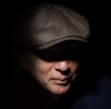Bert Carson's Blog
August 21, 2012
Last Call - Chapter 2 (first draft)
Chapter Two
Ben Jenkins crossed the state line and the New York Thruway soon became the Connecticut Freeway. He was the the least publicly known of the three journeying to Green Mountain, though for a few minutes on Christmas Eve, ten years earlier, the eyes of the world had been on him. Those few minutes of fame were the reason he’d given up his comfortable life and become a recluse, living in a small cabin, on the bank of the Pearl River, in south Mississippi, not far from the Mississippi - Louisiana border.
Even after ten years of seclusion, there were still occasions, when miracle seekers and plain curiosity hounds would seek him out. He knew that had the event that changed his life so abruptly had not happened on Christmas Eve and in front of TV cameras he would have likely been able to avoid the laser beam of public scrutiny. However, he also knew there was no way to turn back the clock so he came to terms with what had happened that fateful day.
Ben lived alone then, as now, only instead of living like a hermit, in a cabin in a swamp, he lived in a small, prosperous town, where he was a well liked, through eccentric, local entrepreneur. He was a man of many interests and he was content with his lifestyle. That all ended with a phone call from the local hospital. The caller, Franklin Pridmore, a friend and the administrator of the hospital, explained that a young man and his wife and two sons had been involved in an auto accident on I59. The man and his wife were in fair condition, but, both the boys had suffered multiple broken bones and internal injuries. Because the highway were closed due to snow and ice, which was the factor that caused the one car accident, Franklin asked Ben if he would fly one of the boys to Birmingham. He explained that Larry Walker, the local airport manager, would fly the other boy. He noted that it would take two planes since each of the boys would be accompanied by a nurse.
Ben quickly agreed and in minutes he was headed for the airport. When he arrived, Larry Walker was already there The airport manager said, “I’ve already preflighted your plane and mine. I talked to Birmingham and they said they expect to close the airport within the hour. There is no where else to take the boys, and no other way to get them there, so we have to give it a shot.” He paused and looked at Ben then continued, “There is a real chance we won’t be able to land at Birmingham, and if that happens we will be hard pressed to get clear of this storm and find a place to land with the fuel we’ll have left. Are you sure you’re up for that?”
Without hesitation, Ben said, “We’re the only chance those boys have and I’m not going to take that away from them.”
As they were talking, two ambulances pulled up to the front of the small airport terminal building. Larry and Ben walked outside to meet them. Larry explained the possibilities to the two nurses who had volunteered to the go with the boys. Like Ben, neither of them hesitated in agreeing to go.
As the nurses and paramedics were moving the boys from the ambulances to the planes, Larry was paged for a call. When he returned, he told Ben, “That was Air Traffic Control at Birmingham. The airport is now officially closed. However, since its an emergency, they will try to talk us in. However, if we don’t have the runway in sight when we are down to four hundred feet we’ll have to abort the landing attempt.”
He glanced up into the white sky, and added, “Judging from the way the snow is coming down here, we won’t be able to come back here.”
Ben laughed, “Larry, I’ve got it. Now, let’s get the show on the road before we become navigation hazards for Santa Claus.” Minutes later the two small planes taxied to the main runway, their lights shining bravely through the snow that was falling heavier by the minute. Seconds after lifting off they were swallowed by the snow.
The snow was the biggest news in Birmingham that Christmas Eve. A local TV station had managed to get a reporter and a cameraman into the terminal before the airport and its access roads were closed. The station is an ABC affiliate and ABC New York was searching for human interest stories on Christmas Eve. They found one in Birmingham, Alabama. The young reporter assigned to the story interviewed stranded travelers for an hour, until everyone was tired of hearing their stories. That’s when the reporter got wind of the two boys being flown in from northeast Alabama. That got his boss’ attention and in seconds ABC New York was carrying the story live, even preempting Midnight Mass from St Peters.
That’s how the nation came to know Ben Jenkins. With the conversation between the tower and the two Cessna’s piped into the room the reporter and his cameraman were broadcasting from, everyone heard the controller directing Ben and Larry through the blinding snow. Larry was trying to follow the lights of Ben’s plane while Ben strained for a glimpse of the runway lights. The camera was focused on the solid wall of snow outside the terminal while the audience listened to the two unsuccessful attempts by the tower to talk the planes on to the runway.
After the second attempt, the controller advised Ben that there could not be another try since the snow as not letting up and radar showed no break in it for over a hundred miles in every direction. It was at that point that Ben Jenkins began the action that subsequently forced him into the seclusion of Pearl River County, Mississippi. He keyed his mike and said, “Birmingham control, give us runway vectors one more time.” He paused, then keyed his mike again and added, “this time I will take care of the snow.” He said it so matter-of-factly the controller agreed to a third attempt, as millions of people watched, listened, and prayed.
Five minutes later, the planes again turned on final approach to the runway that was lost in the snow. Then, in full view of the world, and a speechless TV reporter, the snow stopped falling in an area later estimated to be almost a mile in diameter around the Birmingham Airport. The camera ran, recording the eerie scene that needed no commentary. Suddenly, the two small planes flew out of the wall of snow at the western edge of the airport. Moments later they touched down on the main runway. As if on cue, the snow quickly obliterated the scene.
The aftermath of the Miracle of Christmas Snow, as it became known, was phenomenal. Everyone wanted to know Ben, to talk to him, to touch him, to even have him heal themselves or a loved one. Hundreds of people every day showed up in his home town, drove by his house, knocked on his door, and sent him thousands of letters. It was too much for the naturally quiet, small town businessman. He disappeared late one night, less than three weeks into the new year.
Sand tracked him down, his efforts undetected. Sand’s continued monitoring of Ben soon proved that the incident had been neither accident or coincidence. He observed that Ben knew, and routinely practiced laws of the universe that went far beyond scientific law or scientific limitation, as Sand thought of the limiting teachings of science.
The Last Call - Chapter One
Chapter One
Sightless eyes gazed into the clear November sky. With the passing of life, the ability to reflect the light of the full moon riding high overhead had also departed. He was a big whitetail, in the prime of his life. Now he was a recently killed carcase on the side of a seldom used state highway that paralleled Interstate 59, in west Alabama.
The tall, lean, man, dressed in faded jeans, and a white, open-necked, long sleeved shirt that appeared to be made of Egyptian cotton, stepped from his Jeep and walked past the new black Ford Navigator, that was almost at a right angle to the highway it had been weaving down before it dropped off the pavement and hit the buck.
Smoke was curling out from under the hood of the big SUV and a number of warning lights were flashing and at least three alarms were screaming warnings. As the tall man approached, the Navigator the driver, slightly dazed after striking his head against the steering wheel, saw him in the rear view mirror. “Thank, God,” he exclaimed, “I was afraid no one would find me. Thanks for stopping….” His voice trailed away into the gloom of early evening, as the tall man walked past his vehicle without speaking or stopping.
The driver of the Navigator watched the man in the dim light of the SUVs one remaining headlight. He walked straight to the deer, stood beside it for moment, and then knelt beside the animal’s head. It was hard to be sure, but it looked like the man’s lips moved, but the driver could have been mistaken about that. A moment later, the almost drunk SUV driver regained all of his faculties, when the man stood, looked down at the buck, and this time clearly said something. Then the deer’s head snapped up, shook slightly, and the animal gathered his legs under his body and stood.
For a moment, a moment that was forever etched into the drivers memory, the tall man reached out and laid his hand on the buck’s shoulder, spoke again, and then dropped his hand. The buck turned, looked at at the man, snorted, shook his head, and in two bounds, cleared the highway and disappeared in the deep shadows of the trees on the opposite side of the road.
The tall man stood motionless for a moment, listening to the sounds of the buck crashing through the underbrush. When all sound of the deer’s passing had faded the man turned back toward the SUV. As he approached the drivers window, the man, in an ill disguised, aggravated tone said, “It’s about fucking time. I need help.”
Without pausing, the tall man, in a low and very clear voice, said, “I’ve already helped. Weren’t you watching?”
For a moment, the man couldn’t believe he was being abandoned. Then he got it and screamed, “But what about me?”
The reply that drifted back to him was as soft as the first statement, but clearly audible. “You’ll figure it out, and if you don’t, you’ll die.”
An instant later the Jeep cranked, pulled out to clear the Navigator, then moved smoothly away, east bound.
********
The Jeep wasn’t old or new. It was ageless, like Ben Jenkins, the man who drove it effortless through the pre-holiday traffic on the beltway that circles Washington, D.C. Ben had never been in D.C., yet there was no sign of wonder about him. The look on his face, etched by the dim lights of the instruments and the headlights of oncoming traffic, could only be described as intent-on purpose.
That had been his dominate expression since the he’d received the strange phone call. The call summons him from his isolated cabin on the Pearl River in South Mississippi, to an equally isolated cabin in the Green Mountains of Vermont.
His caller, a man he had never met but felt he knew well, was probably the only person on earth who could summons him to a meeting, twelve hundred miles away from the home he hadn’t been more than twenty miles away from, in over ten years.
************
Joseph Crenshaw Sanders, simply Sand, to all who knew him and to the millions who had only heard of him, knew him as a figure on their TV, or a voice on their radio, stared into the fireplace, as the flames cast shapes and shadows on the walls of his spacious cabin, now lit only by the fire and the trembling light of a half dozen hand-dipped candles strategically placed around the room.
His long legs rested on the rough hewn coffee table. His upper body was half-encased in the center section of the old, curved, sofa in front of the fireplace. Had his eyes been closed, you would have thought he was sound asleep. He wasn’t.
His eyes never blinked as they reflected the jumping light of the fire. Behind his eyes, he was thinking of the three phone calls he had placed almost forty-eight hours before. Three calls he knew could change the destiny of the planet. Three calls that he knew were his last, best shot, at halting the final suicidal rush of mankind.
Actually the calls Sand had made weren’t calls at all, they were summons. Summons to three people he had never met. However, in spite of that, each summons had been accepted and even now the recipients of the calls were on the way to his cabin.
His trance-like appearance was broken when a small grin touched his lips and a flash appeared in his eyes that wasn’t generated by the firelight. He was excited, or as close to being excited as he allowed himself to be, at the prospect of working with the three, in spite of the fact that he knew that no matter how it went, it would be the last work he would do in this incarnation.
His three guests were each driving and traveling alone. They had told no one where they were going. They couldn’t share the purpose of their trip. None of them knew that. Only Sand knew why they were coming to his home.
************
Miller Hamilton was traveling the farthest. Miller lived in Albuquerque, New Mexico. Few people knew Miller and those who did, had no idea where he was or what he had been doing for the past twenty odd years. Sand knew. He had made a point of knowing and with equal tenacity he made sure Miller did not know his interest.
In the sixties, when it was popular to attempt to raise one’s consciousness, Miller had written a book. His book went far beyond the pop psychology of the day. It explored the possibility of living without limits: physical, mental, or any other. Miller’s book was too far ahead of its time, in a time that was already too far ahead of itself. The coldness of the book’s reception prompted Miller to isolate himself in the Sandia Mountains just outside Albuquerque. His original objective had two parts: first to prove that everything he had written could be done and second, take the proof back to his critics.
Sand knew that in the years of his isolation, Miller had manifested his theories as the reality of his life. In the process he had transcended many of the so called scientific laws of the times. In so doing, Miller had reached a point where he no desire or need to take his proof to the world. In fact, Miller Hamilton had never even hinted publicly or privately of his accomplishments. Sand alone knew what Miller had done and when he disclosed that knowledge to the philosopher turned recluse, Miller instantly agreed to the trip.
Barbara Rodriguez wasn’t a recluse. She made the nightly news regularly as the psychic of the stars and the movers and shakers on the planet. Her clients ranged from corporate leaders to pop stars, and included more than a few of Washington’s most powerful politicians. Barbara was a woman of wealth, influence, and power. Yet, twenty minutes after she talked to Sand, who somehow had called on her most private, personal phone line, she left her Fort Lauderdale beach home and began a hard drive through the early fall chill of the northeast, totally focused on her destination, the Green Mountains of Vermont.
As Sand thought of the psychic she was driving through Virginia, just north of D.C., alone in her Rolls Royce, rediscovering the skill of driving the automobile that was normally driven by her chauffeur.
After stopping to help the dead deer, Ben Jenkins, the recipient of Sand’s third call, was back on the road. Though he didn’t know it, he was six hours behind Barbara and ten hours ahead of Miller. None of them knew the other. Their only connection was a phone call from Joseph Crenshaw Sanders, a man none of them had ever met.
April 11, 2012
Imagine
 Jesus wasn't a Christian and for that matter Lao Tzu wasn't a Taoist and Buddha wasn't a Buddhist. Like all enlightened beings they walked their own path, and they had no use for religion, politics, creeds, or any other form of "right and wrong" as defined by society.
Jesus wasn't a Christian and for that matter Lao Tzu wasn't a Taoist and Buddha wasn't a Buddhist. Like all enlightened beings they walked their own path, and they had no use for religion, politics, creeds, or any other form of "right and wrong" as defined by society.
Once Jesus was asked, "Teacher, which is the greatest commandment in the law?"He replied, "Love the Lord your God with all your heart and with all your soul and with all your mind. This is the first and greatest commandment. And the second is like it: Love your neighbor as yourself. All the Law and the Prophets hang on these two commandments."
Imagine for a moment, a single moment, a world where we all loved each other - regardless of race, creed, culture, or economic status – a world where your needs are as important to me as my needs are to me – a world where everyone supports everyone else, totally, and unconditionally. Just imagine….
Old Ships and Old Men
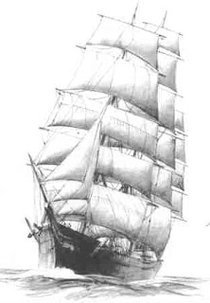
There is a memory stays upon old ships,
A weightless cargo in the musty hold,
Of bright lagoons and prow-caressing lips,
Of stormy midnights, and a tale untold.
They have remembered islands in the dawn,
And windy capes that tried their slender spars,
And tortuous channels where their keels have gone,
And calm blue nights of stillness and the stars.
Oh, never think that ships forget a shore,
Or bitter seas, or winds that made them wise;
There is a dream upon them, evermore;
And there be some who say that sunk ships rise
To seek familiar harbors in the night,
Blowing in mists, their spectral sails like light.
David Morton
And so it is for old men,
And so it will forever more be.
Bert Carson
February 20, 2012
Thoughts on Presidents' Day...
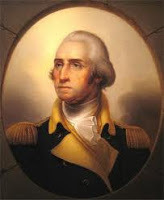 Alittle research revealed that there is a fair amount of dissention regardingwhose birthday we're celebrating today. Wikipedia says it's Washington's birthday. On the other hand, the U.S. Parks Servicesays it's a day set aside to celebrate both George Washington's and AbrahamLincoln's birthdays. Then there's thefair state of Alabama, my home state, which officially celebrates the day asGeorge Washington, Thomas Jefferson Day. I'mgoing to go with Washington and Lincoln, because I am thinking about them. Iinvite you to take a minute or two and join me in those thoughts. This country would not exist had not each ofthem appeared when they did or had either of them failed to act as they did. Inthe beginning, before there was a United States, there existed a group ofcolonies who were very wealthy but practically powerless. A few of the richest members of those colonieswere incensed at the amount of money they paid to the king who had set them upin business. Determining to do somethingabout their situation, they convinced one of their numbers, George Washington,to put together a ragtag army and take on their oppressor – the King ofEngland. Then, the men who recruitedWashington to fight for them, failed to support him monetarily, or in any otherway that mattered. That pretty much tookaway his home field advantage. Thefact that George Washington, with little or no help from anyone, did in factwin the war, is a tribute to the power of his conviction, intention, andability to motivate – being in the right place at the right time didn't hurtanything either. However, winning thewar and freedom from England wasn't George Washington's greatest gift toAmerica. It's what he didn't do thatmade the United States what it is today. George Washington went against the wishes of his supporters and constituents by refusing to become the King of America. That's right. The first Americans did not want aPresident. They wanted a King. Washington made it clear that the only way hewould lead the country was as its President.
Alittle research revealed that there is a fair amount of dissention regardingwhose birthday we're celebrating today. Wikipedia says it's Washington's birthday. On the other hand, the U.S. Parks Servicesays it's a day set aside to celebrate both George Washington's and AbrahamLincoln's birthdays. Then there's thefair state of Alabama, my home state, which officially celebrates the day asGeorge Washington, Thomas Jefferson Day. I'mgoing to go with Washington and Lincoln, because I am thinking about them. Iinvite you to take a minute or two and join me in those thoughts. This country would not exist had not each ofthem appeared when they did or had either of them failed to act as they did. Inthe beginning, before there was a United States, there existed a group ofcolonies who were very wealthy but practically powerless. A few of the richest members of those colonieswere incensed at the amount of money they paid to the king who had set them upin business. Determining to do somethingabout their situation, they convinced one of their numbers, George Washington,to put together a ragtag army and take on their oppressor – the King ofEngland. Then, the men who recruitedWashington to fight for them, failed to support him monetarily, or in any otherway that mattered. That pretty much tookaway his home field advantage. Thefact that George Washington, with little or no help from anyone, did in factwin the war, is a tribute to the power of his conviction, intention, andability to motivate – being in the right place at the right time didn't hurtanything either. However, winning thewar and freedom from England wasn't George Washington's greatest gift toAmerica. It's what he didn't do thatmade the United States what it is today. George Washington went against the wishes of his supporters and constituents by refusing to become the King of America. That's right. The first Americans did not want aPresident. They wanted a King. Washington made it clear that the only way hewould lead the country was as its President.
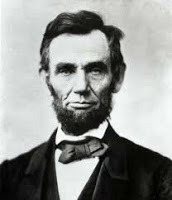 Andwhat of Abraham Lincoln? If you want toconsider a bad job description, think of what the relatively unknownpolitician, and eight-time failure from Illinois was up against. Half the country believed that slavery wasacceptable, the other half believed it wasn't, and both sides were willing to killanyone who opposed them. UltimatelyAbraham Lincoln reunited the country and, yes, it did cost him his life. Washingtoncreated the United States as we know it, when he refused to become itsking. Lincoln saved it during the hourof its greatest peril when he followed his heart, knowing he could well lose hislife.Thedarkest hours this country has ever faced brought forth its two greatestleaders. The world, not just America,owes them both more than we can imagine. It's fitting to consider them today, and every other day that brings athreat to the freedom of even one man, woman, or child on this planet. It brings me a measure of peace to know thaton at least two occasions in history, that threat itself has brought forth itsresolution.Thisis a perfect moment to consider a few of the words of President AbrahamLincoln, spoken at Gettysburg, Pennsylvania, November 19, 1863 -------
"It is for us the living, rather, to bededicated here to the unfinished work which they who fought here have thus farso nobly advanced. It is rather for us to be here dedicated to the great taskremaining before us -- that from these honored dead we take increased devotionto that cause for which they gave the last full measure of devotion -- that wehere highly resolve that these dead shall not have died in vain -- that thisnation, under God, shall have a new birth of freedom -- and that government ofthe people, by the people, for the people, shall not perish from the earth.
"
Andwhat of Abraham Lincoln? If you want toconsider a bad job description, think of what the relatively unknownpolitician, and eight-time failure from Illinois was up against. Half the country believed that slavery wasacceptable, the other half believed it wasn't, and both sides were willing to killanyone who opposed them. UltimatelyAbraham Lincoln reunited the country and, yes, it did cost him his life. Washingtoncreated the United States as we know it, when he refused to become itsking. Lincoln saved it during the hourof its greatest peril when he followed his heart, knowing he could well lose hislife.Thedarkest hours this country has ever faced brought forth its two greatestleaders. The world, not just America,owes them both more than we can imagine. It's fitting to consider them today, and every other day that brings athreat to the freedom of even one man, woman, or child on this planet. It brings me a measure of peace to know thaton at least two occasions in history, that threat itself has brought forth itsresolution.Thisis a perfect moment to consider a few of the words of President AbrahamLincoln, spoken at Gettysburg, Pennsylvania, November 19, 1863 -------
"It is for us the living, rather, to bededicated here to the unfinished work which they who fought here have thus farso nobly advanced. It is rather for us to be here dedicated to the great taskremaining before us -- that from these honored dead we take increased devotionto that cause for which they gave the last full measure of devotion -- that wehere highly resolve that these dead shall not have died in vain -- that thisnation, under God, shall have a new birth of freedom -- and that government ofthe people, by the people, for the people, shall not perish from the earth.
"
If you have a minute I'd love for you to visit my web site
February 19, 2012
Without attachment
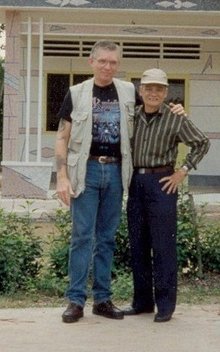
I thought about calling this blog “closure,” until it came
to me that most people equate closure with “the end,” and I realized that there
is no end to what I’m writing about but there is a point where one can, and
must sever attachments. That’s what I’m
writing about; the end of attachment and why that is so important.
In February 1991, Operation Desert Shield became Operation
Desert Storm. One of the little noted
events that followed that action was Vietnam Veterans overrunning VA Hospitals –
not in protest but as patients – patients suffering from PTSD.
I didn’t check into a VA hospital, though it crossed my
mind. Instead, I ran an ad in my local
newspaper. The ad read, “I served in
Vietnam. If you were there and would
like to talk about it meet me at the Best Western…” and I gave the date and
time. That ad led to the founding of
Vietnam Veterans Southern Command.
Almost from the beginning, a main topic at Southern Command
was returning to Vietnam. As the
conversation became more serious, six of us decided we would do it. We set a date and began making plans. As
various deadlines drew nearer - passport applications, ticket deposits, tour
scheduling, etc. - the number committed to the trip grew smaller.
When the Thai Airways flight left LA, in early October,
1993, I was the only member of Southern Command on board. I was glad to be alone in a way that I’m not
sure I can describe, but I’ll take a shot at it.
For almost two years, I’d spent a lot of time talking about Vietnam, my
involvement there, and how it had affected me.
That followed almost thirty years of not talking about it at all. Since I had never talked about it, I wondered if,
after my long silence, I was just making up a story about the Vietnam War’s
place in my life. I was going back to find
out and if it did turn out to be a lie, I didn’t want anyone around to see my reaction. That’s why I was glad to
be alone.
I spent a sleepless night in Bangkok before boarding the
flight for Saigon (I know it’s Ho Chi Minh City to most people – I’m just not
one of them). We barely hit cruising
altitude before we began our decent into Saigon. Our final approach was long and low. As we passed over miles and miles of rice
paddies I had an overwhelming feeling that I was finally coming home. Before the wheels touched the runway at Tan
Son Nhut Airport all self-doubt slipped away; I knew that Vietnam was the most
real story in my life.
I had arranged for a tour guide/translator and a military
guide. I had high hopes of getting
inside Camp Bearcat, my home for the sixteen months I served in Vietnam. That’s why I was accompanied by General Diem,
a certified military guide, and former four-star Viet Cong General. I watched General Diem talk to the guards at
the camp, and then their commanding officer, and finally the commanding officer
of the entire base, which is a training facility for the Army. In spite of his intense effort on my behalf,
I didn’t get through the gate.
However, General Diem took me to other places and taught me
things that were far more important than revisiting Camp Bearcat. First he took me to his veteran’s group –
Vietnam Veterans of Saigon – where I was sworn in as a full-fledged member (at
the first meeting of Vietnam Veterans Southern Command, after the trip, I told
everyone about General Diem, and we voted him into our group). On my third day in Vietnam, my guide and
General Diem took me to Chu Chi. Chu Chi
was the first home of the Twenty-Fifth Infantry Division in Vietnam.
Chu Chi was a poor location for the Twenty-Fifth, because it
was centered over a Viet Cong underground facility that in places operated on
four levels. The VC compound at Chu Chi
had existed since their war with France and at times had housed as many as
25,000 troops.
When we figured out that the VC we were fighting lived under
one of our major headquarters, the Twenty-fifth moved to Camp Bearcat and the
Viet Cong headquarters at Chu Chi was blanket bombed by B-52s of the Strategic
Air Command, based in Bangkok.
Thousands of Viet Cong died and their bodies remained entombed until the
war ended. Then, in spite of being
almost bankrupt as a result of the war and subsequent economic embargo, the
Vietnamese Government found the funds to excavate the ruins at Chu Chi and
recover, identify, and bury with honor, all those who died there.
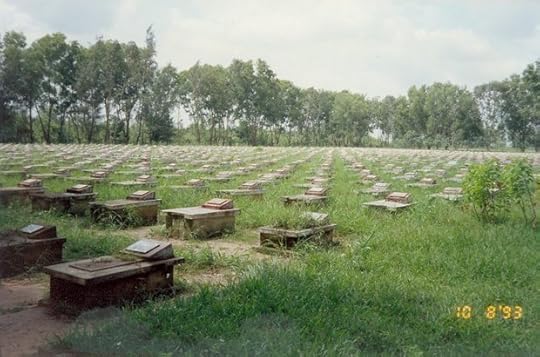
General Diem and I stood in silence, on the edge of that
huge memorial cemetery. When I was able
to speak, I managed to ask him, through our guide/translator, why the government
undertook such a monumental task. He
turned to me, and in very broken English, which I understood perfectly, said, “War
is not over until everyone is accounted for.”
I think about General Diem often. He is probably the most unassuming, impersonal,
yet compassionate man I’ve ever met. And,
in spite of his small stature, he is one of the most powerful. General Diem has accounted for everyone and
everything that matters in his life - that means he is no longer attached to or run by things that happened in the past. Until we account for each of those things in our life, they run us. We're kidding ourselves to believe otherwise.
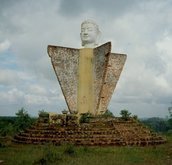
I'd love it if you'd take a minute and visit my web site
then stroll over to my other blog
February 18, 2012
Russell Blake on Amazon's KDP
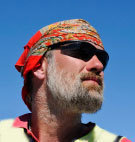 Russell Blake is a friend of mine, and he’s a fine indie
Russell Blake is a friend of mine, and he’s a fine indie
writer with a great sense of humor.
Unlike many of us indie writers, Russell has made a point of staying
abreast of the changes that are coming at indie writers like a runaway
train.
On February 16, he wrote about his experience with Amazon’s
KDP program. There is no definitive,
absolute, carved-in-stone, straight story, total information on the subject -
however, Russell’s experience is definitely worth noting.
Check it out here - and while you’re on his site, sign up,
poke around, enjoy the view from Mexico.
You can follow Russell on twitter @blakebooks
February 15, 2012
Do You Know How To Work A Zipper?
My day job takesme into day care centers. There I meetteachers, parents, and kids. Tuesdayafternoon, I saw a mother pick up her daughter, who I would guess to be sixyears old, and her son, who is probably four. The mother found the son's jacket, helped him get it on, and then turnedto assist her daughter. The boy totallyfocused on the task at hand - zipping his jacket - concentrated for a longmoment on the slide and then the zipper. After a bit of hesitation, he jammed the two together. I watched him silently struggle to get themapart. After a few seconds he stopped,looked across the room, stared into my eyes, and asked, "Do you know how towork a zipper?"I said, "Yep," andmotioned for him to come to me. He didso without hesitation, and together we figured out the problem and resolved it.__________________Twelve months ago,I finished writing Fourth and Forever , the story of a close knit family of three: Josh,the husband who happens to be a career Army helicopter pilot, Kathy, his highschool sweetheart and wife, and Bobby, their son, a high school senior who hasworked hard to become an outstanding football player.
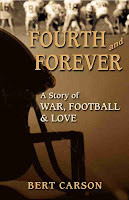 Thanks to the ableproof-reading and editorial assistance of my wife, Christina, an accomplishedwriter, I declared the manuscript ready to publish. Well, almost ready. I needed a cover. I didn'tthink that would be a problem. An acquaintanceof ours does book covers professionally. Our friend said she had never done an eBook cover, but I convinced herto take a shot at it. The results werebeautiful – a distant view of football team with a football helmet in theforeground. It was a beautiful cover, fora hardcover book, but not an eBook.
Thanks to the ableproof-reading and editorial assistance of my wife, Christina, an accomplishedwriter, I declared the manuscript ready to publish. Well, almost ready. I needed a cover. I didn'tthink that would be a problem. An acquaintanceof ours does book covers professionally. Our friend said she had never done an eBook cover, but I convinced herto take a shot at it. The results werebeautiful – a distant view of football team with a football helmet in theforeground. It was a beautiful cover, fora hardcover book, but not an eBook.
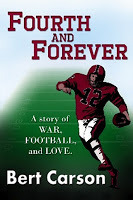 I didn't realizethat at the time, so I published
Fourth and Forever
with the beautifulcover. In three months, I sold less thana dozen copies, and I knew almost everyone who had purchased one. In July, I decided the cover was the cause ofmy nonexistent sales performance. Ifound a copyright free graphic of a football player and asked our partner, AdrienneWall, to use it to create a new cover. She did, and I replaced the beautiful cover with the new creation. Sales are up butnot by much, and I know the change in covers has had nothing to do withit. Sales are up because I'm bloggingmore, and twittering more, and I've discovered Triberr, which has greatly expandedmy blog reach. That means more peopleare hearing about me and out of curiosity some of them are buying my books.
I didn't realizethat at the time, so I published
Fourth and Forever
with the beautifulcover. In three months, I sold less thana dozen copies, and I knew almost everyone who had purchased one. In July, I decided the cover was the cause ofmy nonexistent sales performance. Ifound a copyright free graphic of a football player and asked our partner, AdrienneWall, to use it to create a new cover. She did, and I replaced the beautiful cover with the new creation. Sales are up butnot by much, and I know the change in covers has had nothing to do withit. Sales are up because I'm bloggingmore, and twittering more, and I've discovered Triberr, which has greatly expandedmy blog reach. That means more peopleare hearing about me and out of curiosity some of them are buying my books.
 The beauty ofTriberr is, not only are more people reading my blogs, I am reading moreblogs. One of the blogs I've recentlybecome a fan of is,
The Writing Bomb
by Jeff Bennington. Jeff, a writer,blogger, and eBook marketing whiz, is on the verge of publishing a new book, anindie author self-help book, he calls
The Indie Author's Guide to the Universe.
Most of Jeff's recent blog posts havebeen excerpts from the guide.I'm not as quick astudy as my young friend at the day-care. It took me a year to finally ask the equivalent of, "Can you work azipper?" What I said was, "Jeff, whatever it costs, Iwant you to help me. I know
Fourthand Forever
is a good book. Willyou help me market it?" That's myversion of, "Do you know how to work a zipper?"
The beauty ofTriberr is, not only are more people reading my blogs, I am reading moreblogs. One of the blogs I've recentlybecome a fan of is,
The Writing Bomb
by Jeff Bennington. Jeff, a writer,blogger, and eBook marketing whiz, is on the verge of publishing a new book, anindie author self-help book, he calls
The Indie Author's Guide to the Universe.
Most of Jeff's recent blog posts havebeen excerpts from the guide.I'm not as quick astudy as my young friend at the day-care. It took me a year to finally ask the equivalent of, "Can you work azipper?" What I said was, "Jeff, whatever it costs, Iwant you to help me. I know
Fourthand Forever
is a good book. Willyou help me market it?" That's myversion of, "Do you know how to work a zipper?"
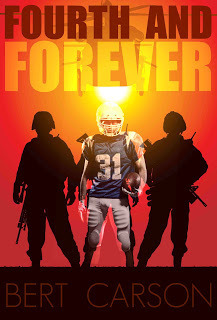 To make a longstory short, Jeff said, "Let me read the book." He did and then said, "Yep, I can work a zipper." We made a deal, and he said, first, you needa new cover. You're book isn't aboutfootball, or at least not just football. It's about war, and veterans, and PTSD, and a whole lot more. Here's the newcover. But the cover is just thebeginning. Jeff gave me a step by stepmarketing plan, the details of which I cannot divulge without having to… youknow the rest of that line. But I cantell you this, I'm going to follow every step, and with Jeff's guidance, I'mgoing to learn to work a zipper, and in the process, I'm going to master eBookmarketing and see
Fourth and Forever
become a best-seller.If your book isn't selling the way you expectedit to sell when you published it, contact Jeff Bennington – don't wait a year –do it now - ask him if he knows how to work a zipper. He'll know what you're talking about, and Ican tell you this, he does.
To make a longstory short, Jeff said, "Let me read the book." He did and then said, "Yep, I can work a zipper." We made a deal, and he said, first, you needa new cover. You're book isn't aboutfootball, or at least not just football. It's about war, and veterans, and PTSD, and a whole lot more. Here's the newcover. But the cover is just thebeginning. Jeff gave me a step by stepmarketing plan, the details of which I cannot divulge without having to… youknow the rest of that line. But I cantell you this, I'm going to follow every step, and with Jeff's guidance, I'mgoing to learn to work a zipper, and in the process, I'm going to master eBookmarketing and see
Fourth and Forever
become a best-seller.If your book isn't selling the way you expectedit to sell when you published it, contact Jeff Bennington – don't wait a year –do it now - ask him if he knows how to work a zipper. He'll know what you're talking about, and Ican tell you this, he does. Visit my web site
February 13, 2012
How I Write
I replied, "Sure."
A few days later I emailed him and asked what I should write about.
He said, "Write about how you write," and he added, "We'll run it on Monday, February 13."
I thought about that for a while, and then I wrote this...
How I write.
February 9, 2012
The Class of 1960
Fifty- two years ago today, the classof 1960, Palatka Senior High School, Palatka, Florida, was thinking aheadninety days, to our long awaited graduation day. There were two hundred and twelve of us inthe class, all anxious to be away and about the business of conquering theworld.Now there are one hundred andseventy-nine of us, as best we can count. A few members of the class, all girls, by the way, try to keep tabs onthe rest of us, but it's a tough job. Some of our number, like my good buddy, Jeff Eberhart, have never beenaccounted for. If we had a wall, like the VietnamMemorial in Washington, there would be a quite a few of us listed as missing inaction, along with the thirty-four that have died in action.This New Year didn't start very wellfor the Class of '60. Frank Falls andJordan Matthews left us in January. Theywere both eighteen, when I last saw them. Frank was heading for dental school, and Jordan to a businesscareer. They left fine legacies, butthey are both gone; two more eighteen year old friends, who for me, will alwaysbe eighteen years old, now on the 1960 Wall.
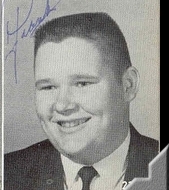 Frank Falls - 1960
Frank Falls - 1960
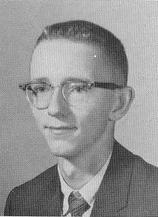 Jordan Matthews - 1960
Jordan Matthews - 1960The year hasn't been a lossthough. Today, February 9, 2012, one ofour favorite teachers, Mrs. Sproull, is celebrating her 100th Birthday.
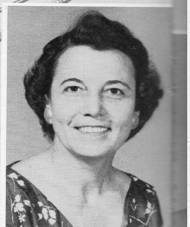 1960
1960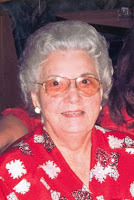 2012
2012And that's why I'm writing this post. We will all be on that wall someday, but we won't all celebrate our 100th. Mrs. Sproull is still teaching us and teaching us well._________________ Happy Birthday Mrs.Sproull, You did very wellby us, and we all appreciate you very much.
Bert Carson
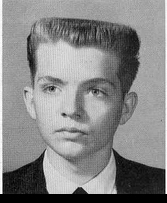 1960
1960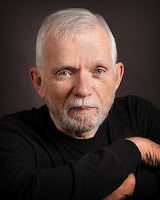 2012
2012One war and four marriages later.

